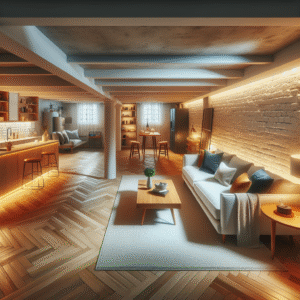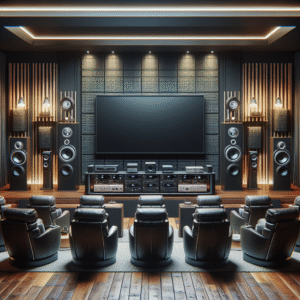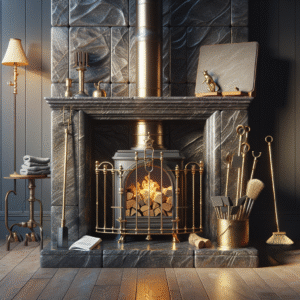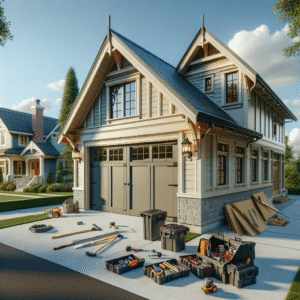Choosing the right flooring material for each room in your home is a crucial decision that affects both the aesthetics and functionality of your living space. Different rooms have different needs, so it’s essential to consider factors such as durability, moisture resistance, comfort, and style when selecting flooring materials. In this guide, we’ll explore various flooring options and provide recommendations for each room in your home, helping you make informed decisions that align with your lifestyle and design preferences.
1. Living Room
The living room is often the heart of the home, a place where family and friends gather, so the flooring should be both stylish and durable. Here are some popular options:
1.1 Hardwood Flooring
- Pros:
- Timeless Appeal: Hardwood flooring is classic and elegant, adding warmth and value to your home.
- Durability: With proper care, hardwood can last for decades and can be refinished multiple times.
- Variety: Available in a range of wood types, colors, and finishes to match any decor.
- Cons:
- Cost: Hardwood flooring can be expensive, both in terms of materials and installation.
- Maintenance: Requires regular maintenance, including sweeping, occasional refinishing, and protection from scratches.
- Best Use: Ideal for living rooms where you want a combination of beauty and durability.
1.2 Engineered Wood Flooring
- Pros:
- Versatile: Engineered wood looks like solid hardwood but is more stable and less prone to warping.
- Cost-Effective: Generally less expensive than solid hardwood.
- Easy Installation: Can be installed over concrete, making it suitable for basements as well.
- Cons:
- Limited Refinishing: Can only be refinished once or twice, depending on the thickness of the veneer.
- Slightly Less Durable: Not as long-lasting as solid hardwood.
- Best Use: A good alternative to solid hardwood, especially in areas with varying humidity levels.
1.3 Carpet
- Pros:
- Comfort: Soft and warm underfoot, ideal for creating a cozy living space.
- Sound Insulation: Carpet reduces noise, making it a good choice for multi-story homes.
- Variety: Available in numerous colors, textures, and patterns.
- Cons:
- Maintenance: Requires regular vacuuming and occasional deep cleaning.
- Stains: Prone to staining and can be difficult to clean.
- Best Use: Perfect for living rooms where comfort and warmth are priorities, especially in colder climates.
2. Kitchen
The kitchen is a high-traffic area prone to spills, so the flooring needs to be durable, easy to clean, and moisture-resistant.
2.1 Ceramic or Porcelain Tile
- Pros:
- Waterproof: Impervious to water, making it ideal for kitchens.
- Durability: Extremely durable and resistant to scratches and stains.
- Easy to Clean: Simple to maintain with regular sweeping and mopping.
- Cons:
- Hard Surface: Can be uncomfortable to stand on for long periods.
- Cold Underfoot: Tile can feel cold, especially in winter.
- Best Use: Ideal for kitchens due to its durability, water resistance, and ease of cleaning.
2.2 Vinyl Flooring
- Pros:
- Water-Resistant: Vinyl is highly resistant to water and moisture.
- Comfortable: Softer and warmer underfoot than tile.
- Affordable: Generally less expensive than tile or hardwood.
- Cons:
- Less Durable: While durable, it’s more prone to scratches and dents compared to tile.
- Appearance: Although available in various styles, it may not have the high-end look of tile or hardwood.
- Best Use: A budget-friendly, durable option that works well in kitchens where comfort is a priority.
2.3 Laminate Flooring
- Pros:
- Cost-Effective: Less expensive than hardwood or tile.
- Variety: Available in many styles that mimic wood, stone, or tile.
- Easy Installation: Often features click-and-lock installation, making it a good DIY option.
- Cons:
- Water Sensitivity: While some laminate is water-resistant, it can still warp if exposed to standing water.
- Limited Lifespan: Not as long-lasting as tile or hardwood.
- Best Use: Suitable for kitchens on a budget, though care should be taken to clean up spills promptly.
3. Bathroom
Bathrooms require flooring that can withstand high moisture levels and frequent cleaning.
3.1 Ceramic or Porcelain Tile
- Pros:
- Waterproof: Excellent resistance to water and humidity.
- Variety: Available in a wide range of colors, patterns, and sizes.
- Durability: Long-lasting and resistant to stains and scratches.
- Cons:
- Cold and Hard: Can feel cold and hard underfoot; consider adding a rug or heated flooring.
- Grout Maintenance: Grout lines may require sealing and periodic cleaning to prevent mold.
- Best Use: The most popular choice for bathrooms due to its water resistance and variety of styles.
3.2 Vinyl Flooring
- Pros:
- Water-Resistant: Vinyl is ideal for wet environments like bathrooms.
- Comfortable: Softer and warmer than tile.
- Low Maintenance: Easy to clean and maintain.
- Cons:
- Less Durable: Prone to scratches and may not last as long as tile.
- Aesthetics: May not offer the upscale look of tile or stone.
- Best Use: A cost-effective alternative to tile, perfect for bathrooms where comfort and ease of maintenance are important.
3.3 Natural Stone
- Pros:
- Luxurious Look: Adds a high-end, natural aesthetic to any bathroom.
- Durability: Extremely durable and long-lasting.
- Heat Conduction: Works well with radiant floor heating.
- Cons:
- Cost: One of the most expensive flooring options.
- Maintenance: Requires sealing and regular maintenance to prevent staining and water damage.
- Cold and Slippery: Can be cold underfoot and slippery when wet.
- Best Use: Ideal for luxury bathrooms where appearance and durability are top priorities, and budget allows for higher costs.
4. Bedroom
The bedroom is a personal space where comfort and warmth are paramount, so the flooring should reflect these qualities.
4.1 Carpet
- Pros:
- Comfort: Soft and warm, making it a cozy option for bedrooms.
- Sound Insulation: Helps reduce noise, contributing to a peaceful sleeping environment.
- Variety: Available in numerous colors, patterns, and textures.
- Cons:
- Maintenance: Requires regular vacuuming and can be difficult to clean if stained.
- Allergen Potential: Can trap dust, pollen, and other allergens, which may not be ideal for allergy sufferers.
- Best Use: Perfect for bedrooms where comfort and warmth are the main considerations.
4.2 Hardwood Flooring
- Pros:
- Classic Aesthetic: Adds elegance and a timeless look to the bedroom.
- Durability: Long-lasting and can be refinished multiple times.
- Increases Home Value: Highly desirable, adding to the home’s resale value.
- Cons:
- Cost: More expensive than carpet and other flooring options.
- Cold Underfoot: Can feel cold, especially in winter, though this can be mitigated with area rugs.
- Best Use: Ideal for bedrooms where a classic, high-end look is desired, and budget permits.
4.3 Laminate Flooring
- Pros:
- Cost-Effective: Less expensive than hardwood but offers a similar look.
- Durability: Resistant to scratches and stains, making it a good choice for children’s bedrooms.
- Easy Installation: Often features click-and-lock installation, making it a good DIY project.
- Cons:
- Noise: Can be noisy to walk on without an underlayment.
- Less Warmth: Doesn’t have the warmth or comfort of carpet.
- Best Use: A budget-friendly option for bedrooms where the look of wood is desired without the high cost.
5. Basement
Basements are prone to moisture and potential flooding, so the flooring needs to be moisture-resistant and durable.
5.1 Vinyl Flooring
- Pros:
- Water-Resistant: Ideal for basements, which are prone to moisture.
- Durable: Stands up well to heavy foot traffic.
- Comfortable: Softer and warmer than tile or concrete.
- Cons:
- Aesthetics: May not offer the same upscale look as tile or hardwood.
- Durability: Can be prone to scratches and dents.
- Best Use: Perfect for basements where moisture resistance and durability are key concerns.
5.2 Concrete
- Pros:
- Durable: Extremely durable and resistant to moisture and heavy traffic.
- Low Maintenance: Easy to clean and maintain.
- Versatile: Can be stained, polished, or painted for a variety of looks.
- Cons:
- Hard and Cold: Concrete can be uncomfortable underfoot without rugs or radiant heating.
- Aesthetics: May not appeal to everyone; some find it too industrial.
- Best Use: Ideal for basements where durability and moisture resistance are paramount, especially in homes with a modern or industrial design.
5.3 Engineered Wood
- Pros:
- Appearance: Offers the look of hardwood but with better moisture resistance.
- Stability: More stable than solid wood in environments with fluctuating temperatures and humidity.
- Durable: Resistant to wear and can last many years.
- Cons:
- Cost: More expensive than vinyl or laminate.
- Not Waterproof: While more moisture-resistant than solid wood, it’s still not suitable for very damp basements.
- Best Use: Suitable for finished basements where a warm, wood-look floor is desired, and moisture is controlled.
Conclusion
Choosing the right flooring material for each room in your home involves balancing aesthetics, durability, comfort, and cost. By considering the specific needs of each room—such as moisture resistance in the bathroom, durability in the kitchen, and comfort in the bedroom—you can select flooring that enhances the beauty and functionality of your home. Whether you opt for the classic elegance of hardwood, the practicality of tile, or the cozy comfort of carpet, the right flooring choice can significantly impact your home’s overall look and feel.








